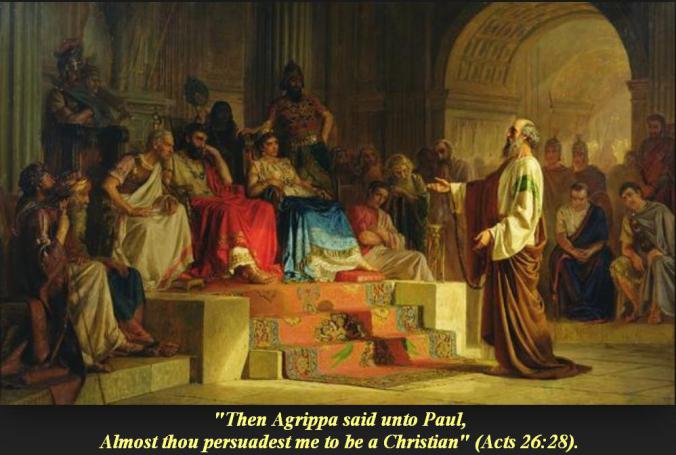“Go therefore and make disciples of all the nations…teaching them to observe all that I commanded you; and lo, I am with you always, even to the end of the age” (Matthew 28:19-20, NASB).
——————–
Contents:
1) Render Unto Caesar (Jon W. Quinn)
2) Almost Persuaded (David Padfield)
——————–

-1-
Render Unto Caesar
Jon W. Quinn
The name “Caesar” was originally the name of a powerful Roman family and eventually became an imperial title. Perhaps the most renowned member of this family was Gaius Julius Caesar. After the dynasty ended with the death of Nero in 68 A.D., the name Caesar was retained to designate future Roman imperial rulers. Much later, leaders of Germany and Russia were called respectively “Kaiser” and “czar” even at the beginning of the twentieth century, both of these titles are derived from the word “Caesar.”
Augustus (27 B.C. – 14 A.D.)
“Now in those days a decree went out from Caesar Augustus, that a census be taken of all the inhabited earth” (Luke 2:1). Augustus was the adopted son of Julius Caesar. His name was Gaius Octavius, and he assumed the name Gaius Julius Caesar Octavianus in accordance with Roman custom. It was later that he added the title “Augustus” which in Latin (the Language of the Romans) means “majestic.” In Augustus’ reign we have the birth of Jesus, in which Augustus unknowingly plays a part in the fulfillment of ancient prophecy.
The decree mentioned in Luke 2:1 compelled Joseph and Mary to return to their ancestral hometown to register in the Roman census. So, despite Mary’s condition of late term pregnancy, the couple traveled from Nazareth of Galilee to Bethlehem of Judea where the baby was born. The Son of God was thus born in Bethlehem just as the prophet Micah had said about seven centuries before (Luke 2:1-11; Micah 5:2).
Tiberius (14-37 A.D.)
“Now in the fifteenth year of the reign of Tiberius Caesar, when Pontius Pilate was governor of Judea, and Herod was tetrarch of Galilee, and his brother Philip was tetrarch of the region of Ituraea and Trachonitis, and Lysanias was tetrarch of Abilene…” (Luke 3:1) The emperor Tiberius, who succeeded his stepfather Augustus, ruled for about twenty-three years. He was a capable administrator but also the object of general dislike. He relied on military power and in Rome had his Praetorian Guard, the only organized troops allowed legally in Rome to keep his rule secure. It was Tiberius Caesar who was reigning during the ministries of both John and Jesus and also when the church had it’s beginning. The church also spread from Jerusalem due to a great persecution that rose against it. One of the persecutors, a “young man named Saul,” after having zealously persecuted the church would become a convert to Christ due to an appearance to him by the resurrected Jesus. Saul would become an apostle and change his name to Paul during the time of Tiberius.
Caligula (37-41 A.D.)
There is no mention of Caligula in the Bible. He was a cruel, insane and tyrannical leader who ruled for four years. During his time, the church continued to spread through Palestine; though some Christians who had fled from Jerusalem during the persecution returned.
Claudius (41-54 A.D.)
Claudius, whose rule of thirteen years was distinguished by the conquest of Britain, and who continued the public works and administrative reforms instituted under Augustus, was the emperor during the three missionary journeys of Paul (although the third journey had not yet been completed when Claudius died). The prophet Agabus had prophesied that a great famine would take place over the world, and Luke informs us that it came to pass during the time of Claudius (Acts 11:28). When the famine hit Judea particularly hard, churches from other places sent funds to relieve the needy saints in Jerusalem and Judea. Claudius didn’t know it, but he was responsible for Paul meeting Aquila and Priscilla when he did. “And he found a Jew named Aquila, a native of Pontus, having recently come from Italy with his wife Priscilla, because Claudius had commanded all the Jews to leave Rome. He came to them…” (Acts 18:2). Historical sources outside the Bible confirm that this did occur. Roman historians speak of this expulsion of Jews from Rome. Evidently, there was some turmoil and unrest over a man called “Christos” (Christ – J.Q.). Though the account does not elaborate, we remember well how the Scriptures of God relate that often there was discord, mob action and even riots associated with the early persecution of the Christians by the Jews. Among those forced to leave were Paul’s soon-to-be friends and co-workers, Aquila and Priscilla, who moved to Corinth where they first met Paul.
Nero (54-68 A.D.)
Nero’s rule at first was moderate, as a result of the wise counsel of advisors. But, he also faltered becoming paranoid (though the threats were sometimes real, often they were not) about all those around him, including his own mother (whom he had killed). It was during Nero’s reign that Rome began persecuting the church, Nero blamed them for a fire that had swept through Rome. His overthrow, which was caused by his later excesses, and his subsequent suicide marked the end of the line of Julio-Claudian emperors, though future emperors retained the name “Caesar.”
Ironically, Nero was the Caesar to whom Paul appealed for justice(!) (Acts 25:11). After Paul was delivered to Rome, Nero placed Paul under house arrest (Acts 28:19). Paul writes of teaching the gospel to some of the Praetorian Guard and that some members of Nero’s own household were Christians during his imprisonments (Philippians 1:13; 4:22). Paul was eventually released, but then later rearrested and executed. He writes of his coming execution in 2 Timothy 4, a chapter showing his great faith and confidence.
Galba, Otho, and Vitellius (68-69 A.D.)
Brief reigns.
Vespasian (69-79 A.D.)
Vespasian and his sons, the emperors Titus and Domitian, are known as the Flavians. Vespasian fulfilled Jesus’ prophecy concerning the destruction of Jerusalem (with his son, Titus, being the commander in the field) (Matthew 24:1,2).
Titus (79-81 A.D.)
The famous eruption of Vesuvius that destroyed the towns of Herculaneum and Pompeii happened during the rule of Titus.
Domitian (81-96 A.D.)
Domitian became a cruel tyrant in the later years of his rule, and the period of terror associated with his name ended with his murder. John was exiled to the island of Patmos and wrote the Book of Revelation from there concerning a great persecution against the churches in Asia Minor. Emperor worship was commanded of the people, and Christians would not oblige (Revelation 16:2, et.al.). But the message from John assures them of complete and final victory if they would be faithful even unto death (Revelation 2:10). The message speaks of the fall and defeat of Rome, the defeat of Satan, and victory of Jesus and His faithful ones.
— Via the Bradley Banner, July 6, 2003, published by the Bradley Church of Christ in Bradley, Illinois
——————–

-2-
Almost Persuaded
David Padfield
For two years Porcius Festus held Paul prisoner in Caesarea Maritima. When Felix succeeded Festus, “the high priest and the chief men of the Jews informed him against Paul; and they petitioned him asking a favor against him, that he would summon him to Jerusalem — while they lay in ambush along the road to kill him” (Acts 25:2-3).
Unaware of the plot to kill Paul, Festus asked him if he would be willing to go to Jerusalem to be judged. Paul responded by saying, “I stand at Caesar’s judgment seat, where I ought to be judged. To the Jews I have done no wrong, as you very well know. For if I am an offender, or have committed anything deserving of death, I do not object to dying; but if there is nothing in these things of which these men accuse me, no one can deliver me to them. I appeal to Caesar” (Acts 25:10-11).
By exercising his right as a Roman citizen, Paul appealed his case to Augustus Caesar. While waiting for a ship to take Paul to Rome, Festus asked King Agrippa to help him “specify the charges” against Paul (Acts 25:27). Agrippa, the great-grandson of Herod the Great, had been appointed ruler of Abilene, part of Galilee, Iturea and Trachonitis by the Roman Emperor Claudius.
King Agrippa permitted Paul to freely speak concerning the charges made against him by the Jews. Luke records the moving sermon Paul preached to Agrippa in the twenty-sixth chapter of the book of Acts.
While speaking of the death, burial and resurrection of Christ, Paul was interrupted by Festus and accused of being “beside” himself (Acts 26:24). Luke then records these words of Paul: “I am not mad, most noble Festus, but speak the words of truth and reason. For the king, before whom I also speak freely, knows these things; for I am convinced that none of these things escapes his attention, since this thing was not done in a corner. King Agrippa, do you believe the prophets? I know that you do believe” (Acts 26:25-27). Agrippa uttered one brief sentence in reply to Paul. He said, “You almost persuade me to become a Christian” (Acts 26:28).
One of the saddest words heard at the judgment will be the bitter cry of “almost.” To “almost” be a Christian is to be a child of Satan. To “almost” repent of your sins is to die in your sins. To “almost” be saved is to be eternally lost. To “almost” go to heaven is to be sent to hell. “Almost cannot avail; almost is but to fail; sad, sad, that bitter wail — almost, but lost.”
— Via Roanridge Reader, Volume 28, Issue 26, Page 1, June 30, 2013
——————–
The Steps That Lead to Eternal Salvation
1) Hear the gospel — for that is how faith comes (Rom. 10:17; John 20:30-31).
2) Believe in the deity of Jesus Christ, the Son of God (John 8:24; John 3:18).
3) Repent of sins. For every accountable person has sinned (Romans 3:23; Romans 3:10), which causes one to be spiritually dead (Ephesians 2:1) and separated from God (Isaiah 59:1-2; Romans 6:23). Therefore, repentance of sin is necessary (Luke 13:5; Acts 17:30). For whether the sin seems great or small, there will still be the same penalty for either (Matt. 12:36-37; 2 Cor. 5:10) — and even for a lie (Rev. 21:8).
4) Confess faith in Christ (Rom. 10:9-10; Acts 8:36-38).
5) Be baptized in water for the remission of sins (Mark 16:16; Acts 2:38; 22:16; 1 Pet. 3:21). This is the final step that puts one into Christ (Gal. 3:26-27). For from that baptism, one is then raised as a new creature (2 Cor. 5:17), having all sins forgiven and beginning a new life as a Christian (Rom. 6:3-4). For the one being baptized does so “through faith in the working of God” (Col. 2:12). In other words, believing that God will keep His word and forgive after one submits to these necessary steps. And now as a Christian, we then need to…
6) Continue in the faith by living for the Lord; for, if not, salvation can be lost (Matt. 24:13; Heb. 10:36-39; Rev. 2:10; 2 Pet. 2:20-22).
——————–
Tebeau Street
CHURCH OF CHRIST
1402 Tebeau Street, Waycross, GA 31501
Sunday: 9 a.m. Bible Classes and 10 a.m. Worship Service. We also have a Congregational Song Service at 5 p.m. for every first Sunday of the month.
Wednesday: 7 p.m. Classes
evangelist/editor: Tom Edwards (912) 281-9917
Tom@ThomasTEdwards.com
https://thomastedwards.com/go/all.htm/ (This is a link to the older version of the Gospel Observer website, but with bulletins going back to March 4, 1990.)